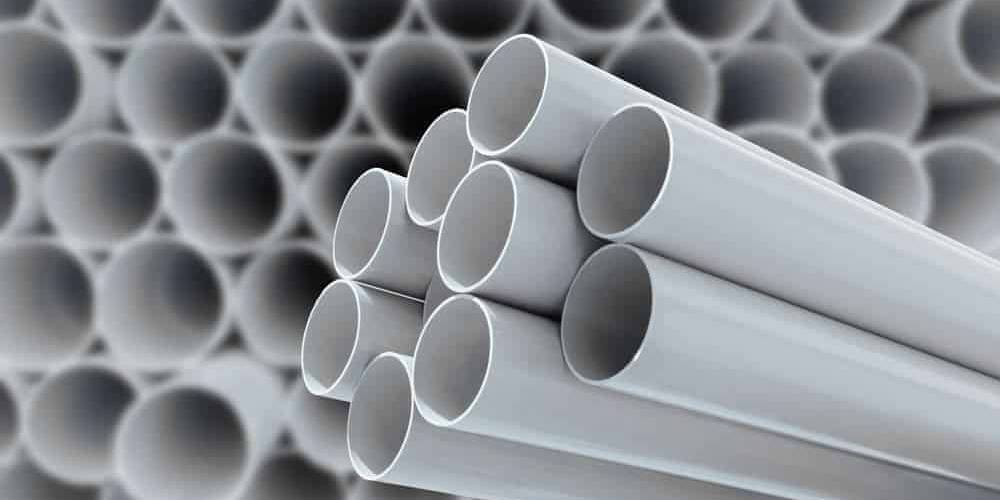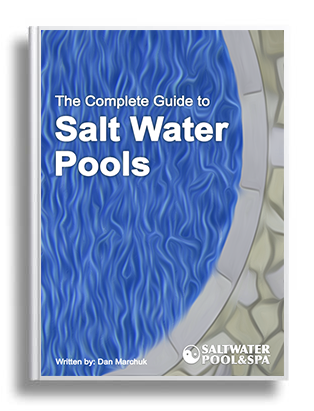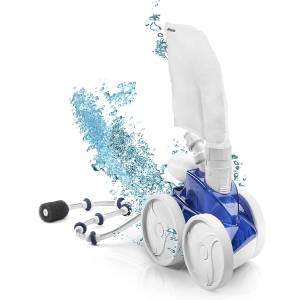- Salt Water Pool and Spa
- Pool Pumps
- Total Dynamic Head
Total Dynamic Head
Total dynamic head or TDH is the amount of resistance in a hydraulic system and the measurement used to determine the amount of back pressure in a pool's plumbing. It's important to know because it provides a gauge when estimating the correct sizing of a pool pump that will adequately circulate water through the pool's hardware and plumbing.

Properly calculating the TDH will ensure that all your devices operate how they are supposed to. A spa with low head will not produce enough jet pressure and a solar heater won’t effectively heat your pool without adequate flow. It's even more important for salt water pool owners because a salt system won't produce enough chlorine if the water isn't turned over adequately in a 24 hour period.
The Complete Guide to Salt Water Pool MaintenanceEverything you need to know to maintain your salt water pool and keep it running smoothly all season. |
|
Why Calculate Total Dynamic Head?
Whether you are constructing a new swimming pool, replacing an old pool pump or adding features to your pool you may need to calculate the TDH to ensure that there is enough horsepower provided by the pump. On the other hand if you are using a pump that has too much horsepower you can cause damage to your filter and in extreme cases cause the plumbing to rupture.
The average residential inground swimming pool has between 50-60 TDH and above ground swimming pools have between 20-30 TDH. These calculations will vary depending on the factors like the length and diameter of the plumbing or if you have accessories that create resistance to the flow like a spa or water fountain. If you would like more information about choosing the right pump for your system visit our pool pump sizing page.
We'll go through each step in calculating the total dynamic head of your pool system. It can be a bit complicated but after you read these steps you should have a really good idea of the requirements of your specific pool. If you have unique features this calculation is important to ensure they all operate optimally.
Total Dynamic Head of Pool Hardware
The following are items within a pool system that will cause additional resistance to the flow of water and will create a larger feet of head. We will go over each accessory and provide an estimate of the feet of head produced but it's important to factor in variables like angled plumbing and the diameter of your pvc piping in addition to:
- Backwash valves
- Angled plumbing
- Valves and fittings
The following features each add their own additional resistance. If you have any of the features below you will need to include them in your total dynamic head calculation. If you don't have any additional hardware you can skip down to the sample TDH calculations to get a good idea of your pool's resistance.
Roof Mounted Solar Heater
A roof mounted solar heater is one of the biggest causes of resistance in residential swimming pools. It will create a high TDH because of the resistance created in pushing the water through an elevated system that can exceed 10 feet. A high water pump head is produced with any roof mounted solar heaters and will require a high head pump to move water sufficiently through the plumbing.
Spa or Hot Tub
There is nothing worse than a hot tub that doesn't proceed enough pressure in the jets. In addition to taking some of the enjoyment out of your soak it can cause uneccesary build up in the water lines if there isn't enough pressure. Another common problem is that when the spa is running you won't get proper circulation in your pool.
Fountain or Waterfall
A simple waterfall or fountain that is attached to your pool's plumbing system can cause extensive resistance. This type of accessory is unique because it doesn't require a lot of pressure but it does need constant flow. In this case you want a low head pump that will create a low water head.
In-floor Cleaning System or Pressure Side Vacuum
An in-floor cleaner and pressure side vacuum both operate most effectively with high pressure. A cleaning system requires high head so that it can create enough suction to clean your pool effectively. In most cases the effectiveness of the cleaner is directly related to the amount of pressure produced by the pump.
Polaris Vac-Sweep Pressure Inground Pool Cleaner with Debris BagIf you click on this link and make a purchase, we may earn a commission. |
Above Ground Pools
Above ground pools usually have fewer devices than inground pools and will often only require a low head pump. The major pool pump manufacturers produce pumps that are specifically designed for above ground pools for this reason.
Inground Pools
In ground pools often require medium or high head pumps depending on the amount of accessories you have operated in your system, like a pool slide. We've listed some common total dynamic head calculations that you would find in the average system in North America.
Sample TDH Calculations
In Ground Pool
- Backwash Valve - 16
- Filter - 12
- Heater - 8
- Plumbing - 4
- Return - 4
- Total TDH - 44
Spa
- Backwash Valve - 15
- Filter - 12
- Heater - 10
- Plumbing - 5
- Return - 12
- Total TDH - 54
Above Ground Pool
- Backwash Valve - 10
- Filter - 8
- Heater - 4
- Plumbing - 4
- Return - 2
- Total TDH - 28
Waterfall
- Elevation Rise - 12
- Plumbing - 5
- Return - 3
- Total TDH - 20
After you have determined the total dynamic head and amount of water pump head required you can make an informed decision about what type of pump you need. There are pumps available in a variety of sizes that will
suite your unique pool system including above
ground pools with low or medium head. There are high head pumps if
you need to operate a cleaning system or solar heating system
You might also want to consider a variable speed pump for its ability to operate at a low head for regular pool circulation and medium head for times it is needed like when you are opening a water feature or attached spa. A variable speed pump will reduce operating costs substantially.
We hope this helps you get a good idea of the total dynamic head of your pool system. In most cases you won't have to worry about this calculation unless you have additional features that create added resistance.
Disclaimer
Please use all appropriate and proper safety precautions when attempting projects on this website. All projects are attempted at the reader's own risk.
Salt Water Pool and Spa™ participates in the Amazon Services LLC Associates Program, as an Amazon Associate we may earn a commission from qualifying purchases.

